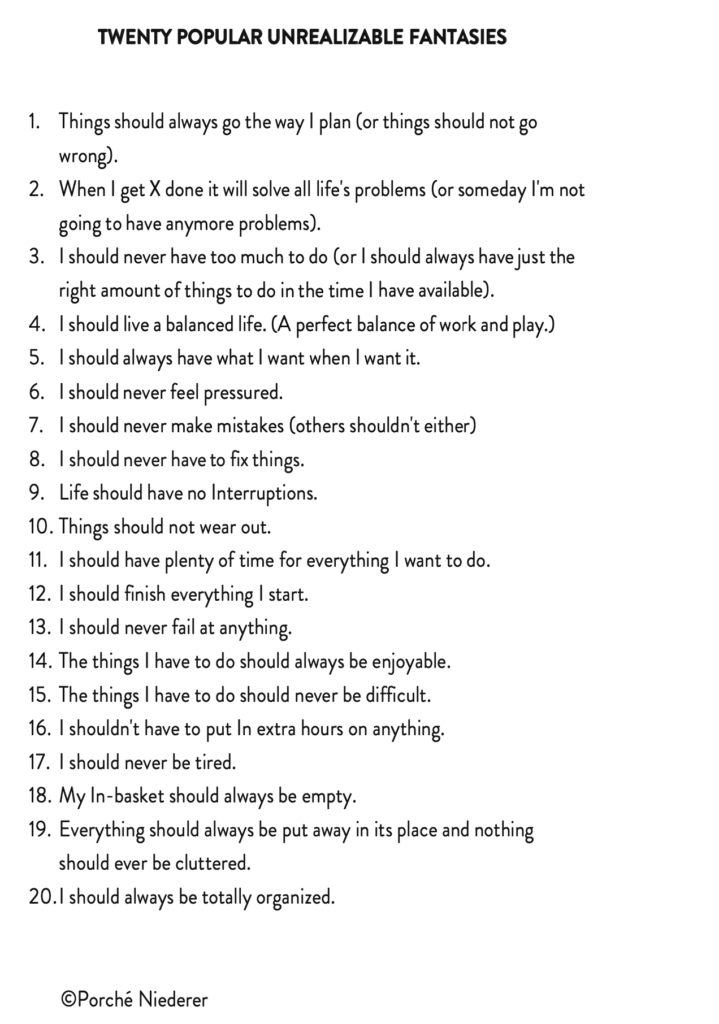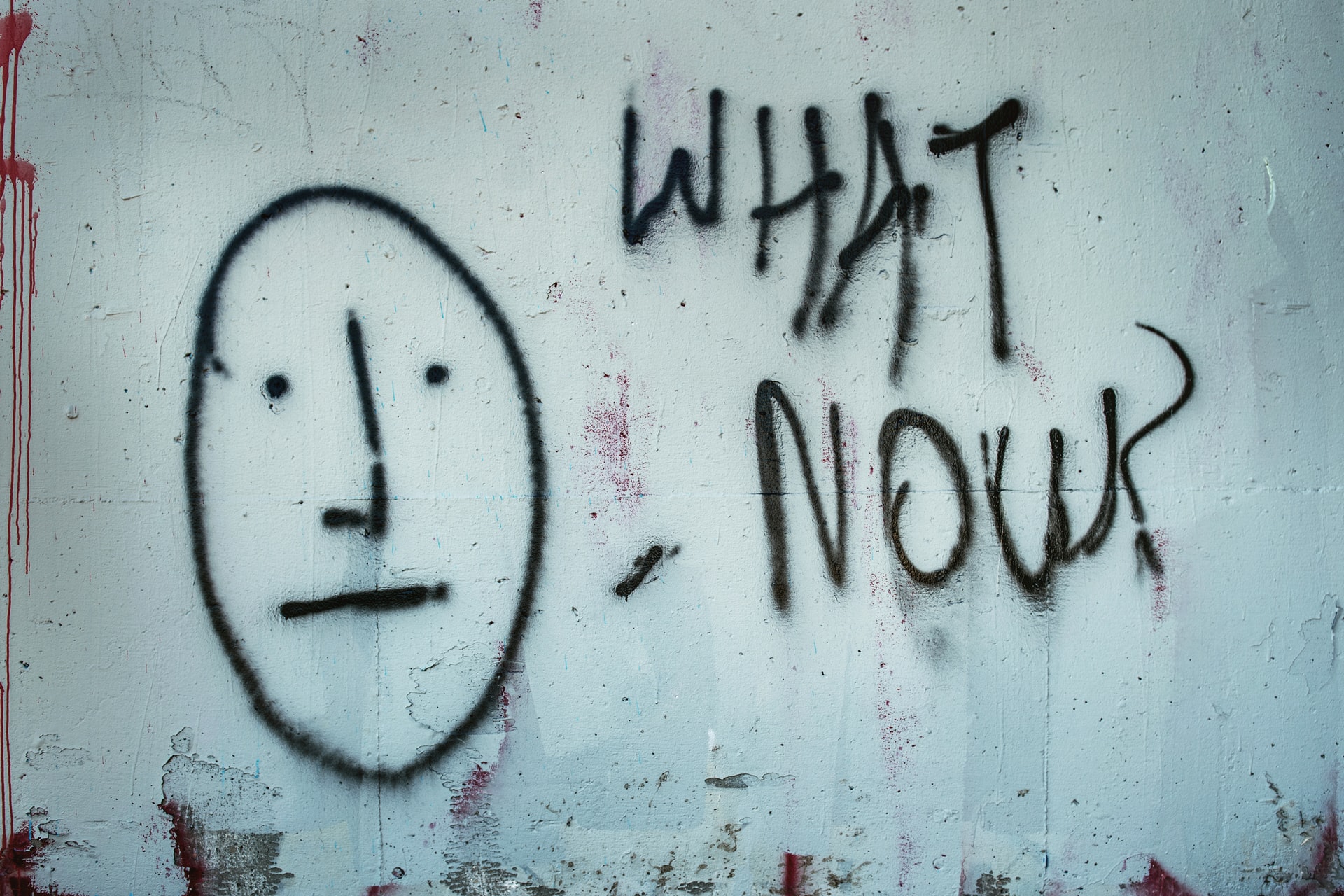We’ve all heard the expression “it is what it is.” It’s true and the “it is what it is” philosophy can get really annoying or be a pathway to the experience of freedom.
The reality is, when something happens, it has happened. Unfortunately, we as humans don’t have the ability to change the past. Yet, so often, when something happens that was not intended, or not expected, or not planned, we get upset?
I believe that we all live by a set of rules that, when one of our rules gets broken, we get upset. The unfortunate thing about our rules is that we didn’t create them, we didn’t agree to them, and we are usually blind to the impact they have on our experience of life. I spoke about this at a talk I gave in 2019. [watch it here: https://www.youtube.com/watch?v=rlvP3mWxwoY].
One great access to our “rules” is the list of “Unrealizable Fantasies” created in 1989 by Germaine Porché and Jed Niederer”. Sadly, it’s hard to see them as fantasies when we truly believe them to be real.
For example, are you someone who believes that you should finish everything on your to do list every day? Do you get frustrated and upset when you go home with incomplete items? Who said you need to finish everything on your to do list?
Consider that if you are somebody managing a business or committed to something you are always going to have more to do then you have time to do it. But we have a belief that we should never have too much to do. That is an unrealizable fantasy.
Unrealizable fantasy #3: I should never have too much to do or I should always have just the right amount of things to do in the time I have available.
This is simply not so. When we’re working on a project and it takes longer than expected, and then must stop to go to the next scheduled event or appointment, we get frustrated because our rule is being broken. And for most of us, it’s not a good thing to break the rules.
If we can shift our perspective that “I will always have more than I can do” and it’s OK to leave things incomplete, it can create a whole new world of freedom going home at the end of the day with items still left on the to do list. As a matter of fact, psychologists like, Daniel Kahneman, have a list of fallacies that mimic the Unrealizable Fantasies. There are ways humans think that get us into trouble. The planning fallacy is a cognitive bias described as “the tendency to underestimate the amount of time needed to complete a future task, due in part to the reliance on overly optimistic performance scenarios.” We’re sunk before we ever get started!
One action you could take when you notice the stress of not finishing a task or your to-do list is remind yourself humans offer underestimate how long a job will take. Remind yourself that you’re human and you underestimated. Take a deep breath and pull out your calendar and schedule time to finish the task. If you made a promise to someone, let them know you’re going to break your promise and be late. Make a new promise and move on. Embrace your humanity.
Unrealizable fantasy #4: I should live a balanced life. I should have a perfect balance of work and play.
Often in business we hear coaches talk about people living a balanced life. I imagine there are some people who can live a balance life (when you meet one please introduce us) but when you are a busy professional with commitments to family, volunteering, taking care of yourself, your business, your clients, people you care about, your pets, staying up on the news, or just a large variety of interests and concerns, how do you fit it all into a 24 hour day and a seven day week? Sometimes it takes a lot of work just to get the priority items taken care of.
A balanced life for most of us is an unrealizable fantasy. But if we can manage our time to handle the priorities, and take care of some of the other things, knowing that not everything will get handled or be balanced, we can create some freedom from the upset. There are certainly practices we can take on to manage our well-being and balance from day to day, but if we expect our lives to be balanced all the time, it’s certainly a fantasy.
And how about our perfectionists? I know I love to beat myself up when I make mistakes. However, mistakes happen. I make mistakes. You make mistakes. Everybody makes mistakes. Everybody! But there’s a unrealizable fantasy (number seven) that “I should never make mistakes, and no one else should either.”
If we can accept that people make mistakes as a true-ism about life, when someone makes a mistake, we can accept that someone made a mistake, and then deal with the reality of what comes next. Can we (me, you, them) fix it? How can we fix it? Most mistakes can be handled. Most mistakes are not life and death but there are life and death mistakes as well. It is a fact of life. Accepting that mistakes happen can provide freedom and an opening to deal with them. Ultimately isn’t that the goal? To eliminate our stressors are anxieties and the things that keep us upset and on edge?
Next time you notice yourself upset by something stop and look at “why am I upset?” What just happened? What rule is being violated? Is that even a good rule? Does that rule apply to me? Then look at what actions you can take or what point of view you could take on to be empowered in this situation. What happened is what happened. All we can control is how we relate to them.
To be continued.

